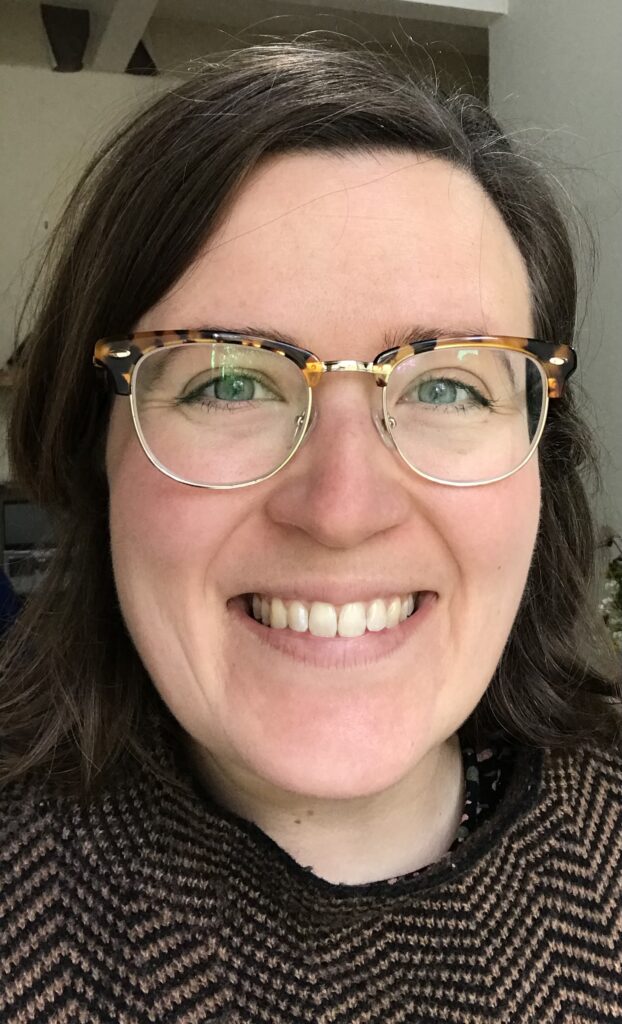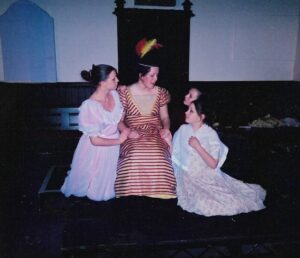Ruth (33) is a Doctor working in Palliative Medicine, a field of medical care which focuses on improving quality of life for patients and families facing terminal illness. Ruth was inspired to pursue medicine as a teenager by the US medical drama ER, but she also attended First Bite Youth Theatre in Edinburgh from the ages of 6 to 18.

She has since drawn on many of the skills and values which she learnt during her time there when encountering challenges in the course of her medical training and career:
“I think having that grounding in drama actually really helped me, especially in communication skills […] I had been taught how to listen to other people, and how to react to body language, or react to what was going on around me.”
Ruth jokes that she soon discovered that being a doctor wasn’t at all like ER, but she has found that “a lot of being a doctor is acting”. At medical school, she found the simulated interview or scenario exams easier than others, as they were essentially acting or improvisation exercises. This has carried through to her work in palliative medicine, where she says she feels especially able to act in or react to any situation because of the communication skills which she developed in youth theatre. She especially credits youth theatre with her ability to practice active listening and to infer more intuitively a patient’s needs from what they say:
“What has really helped me is learning to listen, because [in youth theatre] you had to pay attention to what was going on around you. You couldn’t only be thinking about yourself in any particular situation […] So I think I’ve always found it quite easy to understand or to listen to patients. I’ve always been quite surprised by when you listen to a patient and they tell you something which actually probably would have helped some time ago, but for whatever reason […] there’s been some kind of miscommunication.”
For Ruth, these skills are second nature, and she attributes them principally to the safe, open, and equitable environment which her youth theatre leader created at First Bite.
Ruth remembers herself initially as “quite an annoying and precocious child”. She recalls being “pretty confident”, but suspects in hindsight that she was also quite an anxious child. She would ask a lot of questions, and liked to feel that she was getting things “right”. At youth theatre, though, she found “a different space where you could just be who you wanted to be”. Crucial to this was an emphasis on games and on play:
“I think particularly when you’re a teenager […] there’s probably not that many opportunities to just play a silly game, and be allowed to look silly and to be foolish, and I think that’s what [my youth theatre leader] encouraged. I think that was immensely helpful as a teenager, because you could see that nothing’s going to go wrong if you look silly, and also it makes you feel better. There’s a release, a kind of joy.”
This emphasis on play was at the heart of Ruth’s youth theatre experience, and helped her to feel that her youth theatre was a “safe space” for expression. She recalls there being “a very strong element of trust within the group”, and also credits her leader for consistently creating and maintaining a level playing field among the socioeconomically diverse group. She was “very skilled at encouraging participation from everyone”, and this sometimes involved ensuring louder participants (like Ruth!) to allow others the space to contribute.
In addition to this freeing focus on games and on playing, Ruth remembers relishing the opportunity to be involved in the production side of shows. She particularly loved making props and the creative challenge of engineering, for instance, “a cot with a false bottom”. As she grew older and felt more self-conscious about performing, she was glad to be able to participate more behind-the-scenes. She recalls that there were stresses associated with the production side of shows, particularly in relation to the pressure to sell tickets.
However, she compares these favourably with the more emotional stresses of her other extra-curricular activities. She remembers the challenges of youth theatre providing a “release” from, rather than a catalyst for, the difficulties of teenage life.
“It didn’t feel like an existential crisis, which most of being a teenager is. It was more like: this is a solid thing we can focus on and then complete.”
Ruth largely attributes this to the still enduring emphasis on play at her youth theatre, even in the later years, and she often refers back to this value when facing difficulties in adult life:
“I find that the thing that I constantly want to go back to is that sense of fun.”
In particular, when her medical training became “emotionally very hard”, Ruth found herself drawing on her youth theatre experiences to help her “build resilience”. She recalls going back to her youth theatre group’s “focus on having fun”, and to the importance which youth theatre placed on teamwork, clear goals, and investment in the process of achieving them. Alongside her skills in communication, these values help her in her day-to-day work.
Ruth remembers her 12 years of youth theatre fondly, and wishes she still had a similar outlet in her adult life for fun, silliness, and play. This has been difficult to find or create amidst a somewhat “all-consuming” career, but she finds it “helpful to have those memories and to understand that […] that part of me is possible and it’s still there.” In this way, youth theatre forms something of a touchstone, or a constant to refer back to throughout the stresses of a medical career.
“It’s okay to spend time and effort on something which […] is just a creative endeavour in itself. That’s worth something.”
